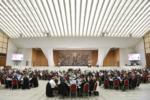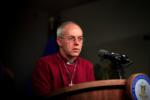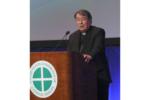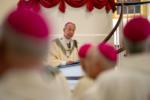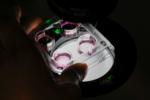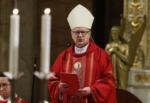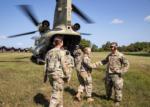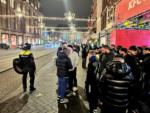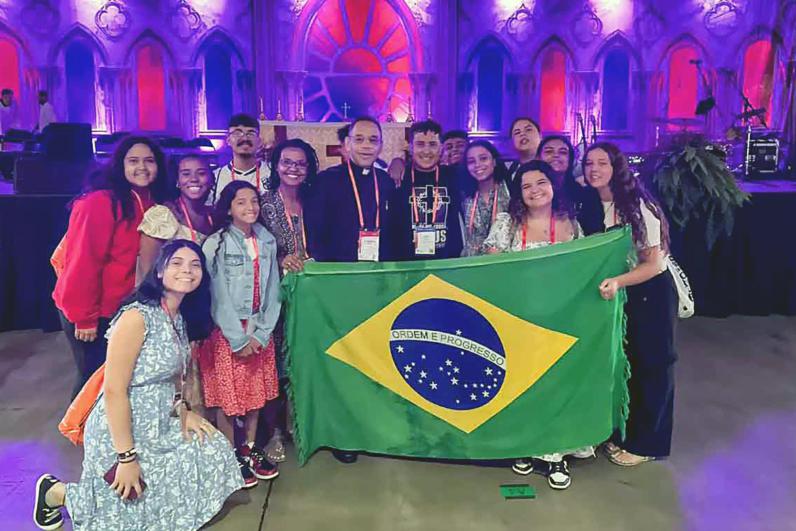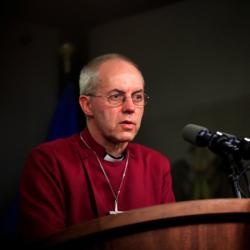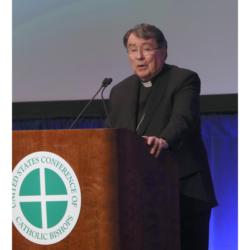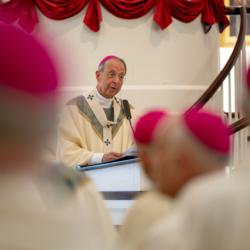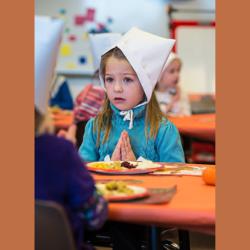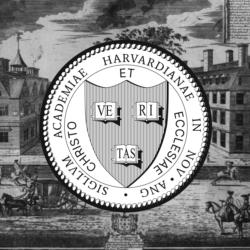National Eucharistic Congress was 'amazing,' 'profound,' say local attendees
BRAINTREE -- Deacon Franklin Mejia, his wife Wendy, and their two children, 20-year-old Gabriel and 17-year-old Isabella, drove 16 hours from Boston to Indianapolis to attend the 10th National Eucharistic Congress, held at Lucas Oil Stadium and the Indiana Convention Center from July 17-21.
When the congress ended, the Mejias drove another 16 hours back to Boston. They'd do it again.
"Overall, I thought it was a wonderful experience," Wendy Mejia, the Archdiocese of Boston's director of multicultural ministries, told The Pilot in a July 23 interview, "being part of such a public display of our faith at a large scale, joining Catholics from all four corners of the United States to come together at one place to celebrate Christ in the Eucharist. That was just amazing."
The congress, which had an estimated 50,000 attendees, was the culmination of the U.S. Conference of Catholic Bishops' National Eucharistic Revival. The revival was launched in 2022 to remind U.S. Catholics about the centrality of the real presence of Christ in the Eucharist to their faith.
"It shines the spotlight on something that is so central to us in our life as Catholics," Bishop Robert Reed told The Pilot in a July 22 interview.
Bishop Reed, Cardinal Seán P. O'Malley, and Vicar General Bishop Mark O'Connell attended the conference, which featured Masses, witness talks, and adoration.
"It was overwhelming, I thought, in a good way," Bishop Reed said. "Wherever you turned, you were surrounded by joyful Catholics."
Across the street from the convention center was St. John the Evangelist Church, which had all-day and all-night eucharistic adoration throughout the congress.
"Whenever I went, it was as crowded as Mass on Christmas Eve," Bishop Reed said. "It was very inspiring to walk in and see so many people, priests and religious, men and women, young children, families, all kneeling in silence, praying and adoring the Lord in the Blessed Sacrament."
The gathering in Indianapolis was the first National Eucharistic Congress held in the U.S. in 83 years. Looking at social media during the congress, Wendy Mejia saw one comment that summed up her thoughts on the event: "See the example that the United States is setting."
"That public display of our faith, and having the world see it, was amazing, as well," she said.
Speaking to The Pilot on July 23, Deacon Franklin Mejia said the congress was "amazing, beautiful, and inspirational" for him and his children.
"It was a real Catholic, Christian experience for them," he said. "I see them growing to understand more what being a Catholic really means."
Over the weekend, he said, Gabriel and Isabella hurried to get to adoration and witness talks on time. They were especially excited to see Father Mike Schmitz, a priest in the Diocese of Duluth with a large YouTube presence.
"I was surprised that they knew some of the speakers already," Deacon Mejia said. "They follow them online."
He enjoyed the speakers and adoration, but what "amazed" him was seeing how many young adults were at the conference.
Eighteen of those young adults were part of a delegation from the Brazilian apostolates of the Archdiocese of Boston and the Diocese of Worcester, led by Father Raphael Pinto.
"It's a great opportunity to see that the church is alive," Father Pinto, parochial vicar of St. Charles Borromeo Parish in Woburn, told The Pilot in a July 23 interview. "It's a perspective that God is working in different ways, in mysterious ways, especially with the youth."
At the congress, he said, the young people he traveled with were able to feel like "people of God."
"Their profound experience was the Eucharist," he said, "especially the adoration."
The Brazilian youth got to have that experience alongside people of all backgrounds, which Father Pinto said proves the universality of the Catholic Church.
When asked what his favorite part of the congress was, Father Pinto had a hard time choosing because he loved all of it. However, he did enjoy the eucharistic procession through the streets of Indianapolis on July 20, which comprised 900 priests, 500 deacons, 500 seminarians, and 900 women religious. An estimated 40,000-50,000 people lined the streets to view the procession.
"I loved the procession," Father Pinto said, "because I think the procession was a great moment to impact the city, to walk with Jesus down the street. We had the opportunity to show our faith in Jesus."
"It was wonderful to see several generations present," Wendy Mejia said, especially during the holy hours.
"You could hear a pin drop," she said. "They were all focused on Jesus in the Blessed Sacrament. Just that peace, the prayers, the music. We were all one in that moment."
She noticed that her children were invested in the holy hours, admiring the silence and how respectful everyone was.
"They were particularly impressed with how well-organized it was and how they were able to partake in some of the breakout sessions, the encounters," she said.
Bishop Reed also praised the organization of the congress, especially given the number and diversity of the attendees.
"I think it was a tremendous success," he said, "and I give a lot of credit to Bishop (Andrew) Cozzens, (National Eucharistic Congress CEO) Tim Glemkowski, and the whole team. I just can't imagine doing something like that all together, really for the first time, and doing it so well."
Wendy Mejia said that driving back to Boston after the congress was "painful" but worth it.
Deacon Mejia said that on the return trip, his family spent 13 hours talking about what they had experienced during the congress.
"We had the opportunity, my family and I, to have more time together," he said.
Both of his children are headed to college this fall, so he cherishes the time he gets to spend with them.
"That was a beautiful opportunity," he said. "I feel like it was a pilgrimage for us."


